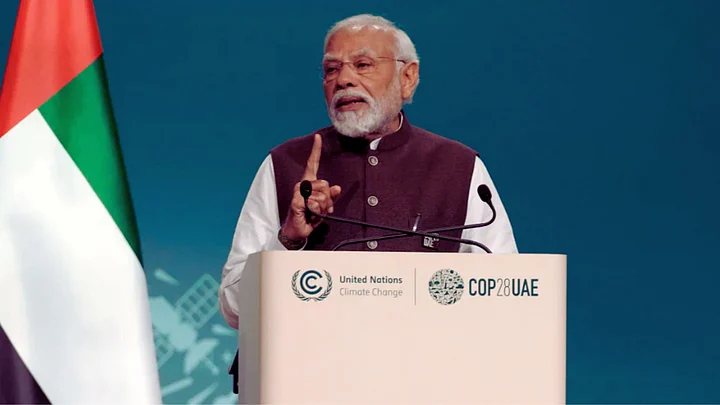Prime Minister Narendra Modi, in his address at COP28, articulated India's steadfast commitment to environmental sustainability while maintaining a delicate balance between economic growth and ecological preservation.
He emphasised that India, representing 17 percent of the world's population and contributing a mere 4 percent to global carbon emissions, is making conscientious efforts in aligning economic development with environmental stewardship.
The speech also underscored India's achievements, outlined ambitious future targets, and called for global collaboration to tackle the urgent climate crisis.
One of the notable mentions was India's near-fulfilment of its Nationally Determined Contribution (NDC) targets.
The emission intensity targets set to be met 11 years ahead of schedule and non-fossil fuel targets likely to be achieved remarkably nine years in advance are a testament to India’s commitment towards sustainable development.
Ambitious Plans for 2030
Looking ahead, PM Modi announced India’s ambitious goals for 2030. The plan aims to reduce the emission intensity by 45 percent, with a simultaneous 50 percent increase in the share of non-fossil fuels, setting the stage for India to achieve net-zero emissions by 2070.
This forward-looking approach aligns with global aspirations for a sustainable and resilient future. But, let’s not forget that this is not a rosy path.
Our study has shown that despite the declining costs of renewable energy (RE), numerous challenges persist, including intermittency and the need for affordable storage solutions, grid stability concerns, reliance on technology and critical mineral imports, and issues related to land acquisition and availability.
These unresolved concerns may, in fact, lead to increased costs of RE in the future. According to our analysis, nuclear power could play a pivotal role in addressing this challenge, making it imperative for India to adhere to its stated goal of installing 65 GW of nuclear power by 2050.
Call for Equity
‘We do not have much time to correct the mistakes of the last century’, warned PM Modi and urged the global community to adhere to climate goals with unity and determination.
He emphasised the importance of providing developing countries with free shares of the global carbon budget in a call for equity—recognising the historical imbalances and reinforcing the need for shared responsibility in the fight against climate change.
Technology Transfer and Finance: A Must for the Clean Energy Value Chain
During its G20 presidency, India prioritised climate discussions, emphasising the need for collective action. The commitment to climate justice funding underscores the recognition that addressing climate change requires financial support for vulnerable nations.
PM Modi reiterated the call for global solidarity, emphasising that climate targets must be both ambitious and equitable, fostering innovation and fairness.
His call extends to the transfer of technology, with developed nations being urged to take the lead in sharing expertise and strengthening the clean energy value chain.
He also emphasised that collaboration in research and development, along with the transfer of expertise, will be critical in effectively addressing the global climate crisis.
Clean Energy Alternatives, Lifestyle Choices, and Collective Action
During the summit, PM Modi spoke about India’s pursuit of a sustainable future, wherein it has taken a leadership role in advancing alternate fuels, and highlighted that the promotion of green hydrogen and launch of the Global Biofuel Alliance underscore India's commitment and determination to explore innovative solutions in the fight against climate change.
In addition to emphasising the importance of collective action, he spoke about India’s ‘Green Credit’ initiative that calls for public participation in carbon sink development and signals a paradigm shift towards a commercial mindset for carbon credits.
Addressing the critical issue of lifestyle choices impacting the environment, PM Modi talked about the ‘Mission LiFE (Lifestyle for Environment)’ initiative as a transformative approach led by India and underlined that studies by the International Energy Agency (IEA) suggest that the widespread adoption of lifestyle changes could lead to a substantial reduction of 2 billion tonnes of carbon emissions.
A study by CSTEP underpins that ‘To ensure sustainable consumption, we do not aspire for Western standards of overconsumption because that may become too unsustainable’ and suggests a partial dietary shift towards millet from rice and the use of public transport for urban and intercity travel, electric cooking, and energy-efficient appliances, which together can save more than 1 GtCO2e in 2070.
India Stands Committed
Expressing gratitude for the continued support for climate justice funding, PM Modi concluded his speech by emphasising the urgency of the situation; urging nations to adhere to ambitious, equitable, innovative, and fair climate targets; and underscoring the shared responsibility to safeguard our planet.
Moving forward, India has expressed its willingness to host COP33 in 2028, further accentuating the nation's commitment to fostering international cooperation and dialogue on climate issues.
PM Modi’s address reaffirmed India’s commitment to achieving NDC targets, with a stark reminder that time is of the essence in correcting the mistakes of the past century.
(The author heads the Climate, Environment, and Sustainability team at the Center for Study of Science, Technology and Policy (CSTEP), a research-based think tank. This is an opinion piece and the views expressed above are the author’s own. The Quint neither endorses nor is responsible for the same.)
